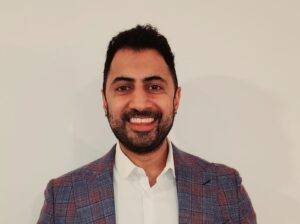Shared decision-making is an approach in health care where clinicians and patients jointly review the best available evidence to support the patient’s care. A crucial component of shared decision-making is listening to patients and considering their individual needs when developing their health care plan. For Advancing Health Scientist Dr. Ricky Turgeon, working with patients to improve their care extends beyond just treatment and includes the design of a study examining shared decision-making within the context of heart failure treatment.
In 2019, Dr. Turgeon approached Marc Bains, a patient living with heart failure, about collaborating on a shared decision-making tool.

“From the start, Ricky always wanted to include patient perspectives and ensure that there was a need for a shared decision-making tool for people living with heart failure, even before he started working on it,” said Marc, who has worked with Dr. Turgeon since then, contributing to several research projects focused on heart failure.
Interviewing patients and clinicians
To start the development of a shared decision-making tool, Dr. Turgeon and his team interviewed patients living with heart failure about their needs and treatment preferences for a program called SHARE-HF. The first phase of this program involved a qualitative study formally evaluating the needs of patients during decision-making. It was recently published in Circulation: Heart Failure and included semi-structured interviews with patients and clinicians conducted by Advancing Health Qualitative Methodologist Saranee Fernando.
“There’s a growing recognition that research needs to be more patient centered and that patients need to have a voice. With this work being co-led by people who have lived experience of heart failure, I think the project itself really speaks to patients and their families,” emphasized Dr. Turgeon.
To conduct this qualitative study, questions were guided by the Ottawa Decision Support Framework, which is both a theoretical and practical framework looking at patient needs or barriers to being involved in making health decisions. Having been in ongoing development for nearly 20 years, this framework includes several different aspects that may be considered when looking at the importance of the several components that make up care, but determining what is important may vary between different patient groups.
Several themes emerged from these interviews, including patient decisional needs, quality of life, and the shared decision-making process during treatment. However, there was not always alignment between patient and clinician priorities when it came to heart failure treatment. For example, under the theme of treatment attribute preferences, patients put less value on cost, lab follow-up frequency, and pill burden compared to clinicians.
One theme which was surprising to the researchers was that interviewed patients valued quality of life less compared to quantity of life. Saranee notes, “Patients just wanted to live a long life, which did mean that they often had to adjust their lifestyles. However, most of these patients showed a great deal of adaptability.”
“Well good quality is getting up every day. Just enjoying myself. I go to my office two days a week…There’s also a social element to it. So that’s part of the good quality of my life, if I couldn’t do that what would I be doing? I can’t run, right, I don’t do that. I can walk. I’ll go for the quality… is breathing every day. That’s the quality of life.” — Patient
With regards to this finding, Dr. Turgeon noted that other heart failure studies have found that people tend to have a strong preference one way or the other when comparing quantity and quality of life, so their observation may not be universal. He also highlighted that as people become more comfortable and live longer with heart failure, the standard for their own quality of life and what it means to them may change.
Illusion of choice
One of the most important recurring themes in the SHARE-HF study, which Saranee noted during her interviews, was that patients with heart failure often did not really feel like they could make choices about their care.
“When I was talking to the patients, they would ask, ‘What choice do I have? I just want to have a beating heart,’ which makes complete sense. On the surface, it may seem very cut and dry, because the medication is needed to keep the heart beating, but there are still important nuances in care to consider,” she said.
Although this analysis found that most patients were satisfied with the decision-making process regarding starting medications for heart failure, it did not provide an opportunity for discussion. Essentially, clinicians were just highlighting the benefits of treatment, rather than engaging in a more comprehensive shared decision-making process.
Dr. Turgeon explains, “Although each patient is unique, they have the common thread of living with heart failure. Even though there may not be a lot of variety in the medication, they shouldn’t be treated all the same. A more holistic conversation tailored to the patient should happen, and that’s where the shared decision-making piece is important.”
“I guess, providing support and advice. We try to have each patient informed and we provide the best possible information that we need to in order for them to decide which medications will be appropriate and to give them the best outcome in their management of their heart failure. Supporting them, recognizing that they’re all adults. And if they have no capacity then the decision then goes to the family and what they want to do.” — Clinician
There is another important factor which could be contributing to the lack of consistent shared decision-making. When patients find out that they have heart failure, there is not only an emotional impact, but also a sense of urgency to provide them with all the information and prescribe appropriate medication. It can often be an overwhelming experience for patients, so Dr. Turgeon suggests that there may be opportunities for shared decision-making later during treatment, especially as regular clinician visits will become routine in their care.
Involving patients every step of the way
This collaborative research, highlighting patient voices, has garnered international attention. The SHARE-HF research was selected for presentation at the American College of Cardiology Scientific Sessions on April 6. When asked about what aspect of this research stood out to cardiologists, Dr. Turgeon suggested, “I think that, not only is the quality of this work really excellent in terms of investigating the ‘why,’ but it also tells a story and gives a voice to the to the issues faced by us and our patients, which is not often highlighted in cardiology.”
This work is just the first phase of four projects planned for the SHARE-HF program. Dr. Turgeon is collaborating with Advancing Health Program Heads of Evaluation, Dr. Beth Snow, and of Decision Sciences, Dr. Nick Bansback, to better understand what matters most to people living with heart failure.

“The goal is to work closely with patients to understand what they need because when you empower patients, they really can move the needle. Once we know what they need, then we can develop and test tools to incorporate that information into their care effectively,” he said.
The SHARE-HF study is only one part of the shared decision-making story. As a pharmacist specializing in heart failure, Dr. Turgeon focuses his research on helping patients navigate their medication needs throughout their health care journey. He started another program, PHARM-HF, to improve the quality of life and survival of people with heart failure by building an outpatient, telehealth-based clinic which provides co-management of medications with pharmacists.
Both these programs have been successful in working with patients to understand and improve shared decision-making. SHARE-HF has also partnered with the HeartLife Foundation, Canada’s first and only patient-run charity for people living with heart failure, to invite patients to participate in research. And the connection? Marc, who co-founded HeartLife within a couple years of him and Dr. Turgeon meeting. They have been working closely together to improve the care for patients living with heart failure ever since.
“I think that more people should be like Ricky in terms of engaging patient partners in research. It can help transform their research and really take it to the next level. Bringing in a patient voice at all stages, like Ricky has done when developing the SHARE-HF program, is the gold standard for how patients should be included in research,” said Marc.
Find more information on heart failure developed with patient partners and clinicians, including Dr. Turgeon, here: https://ourhearthub.ca/
Learn more about the future of SHARE-HF at Dr. Turgeon’s upcoming Work in Progress seminar.



